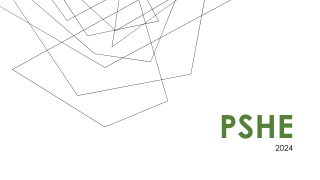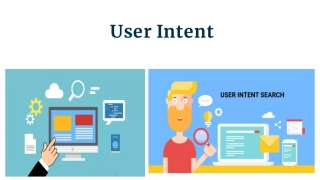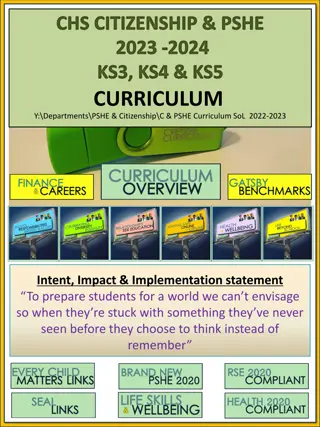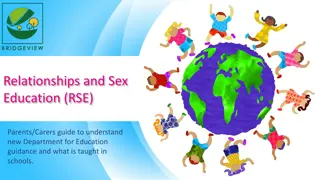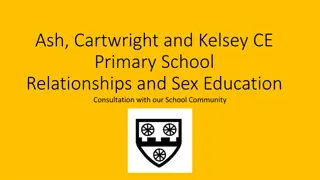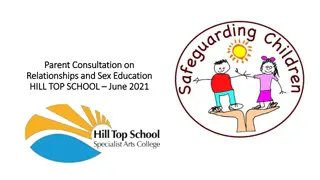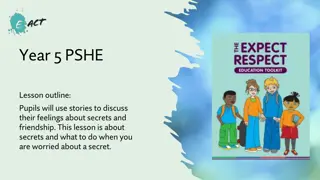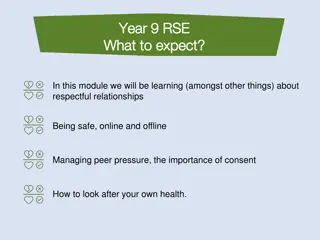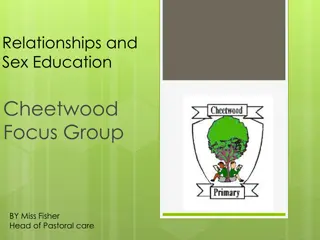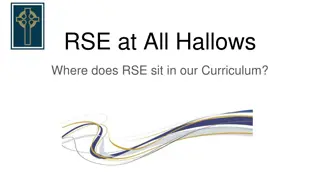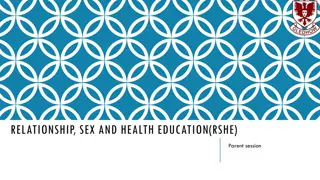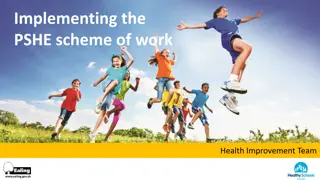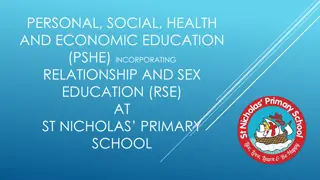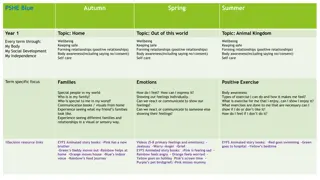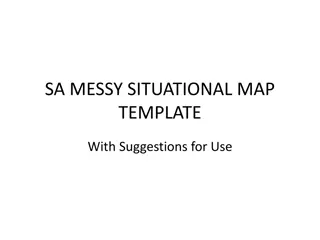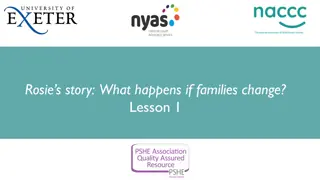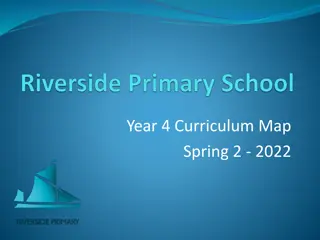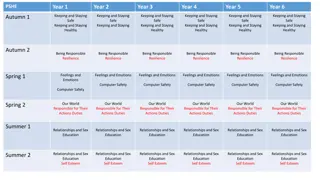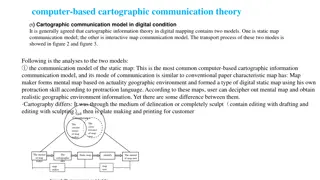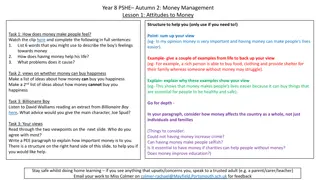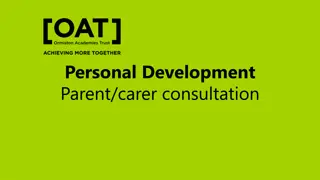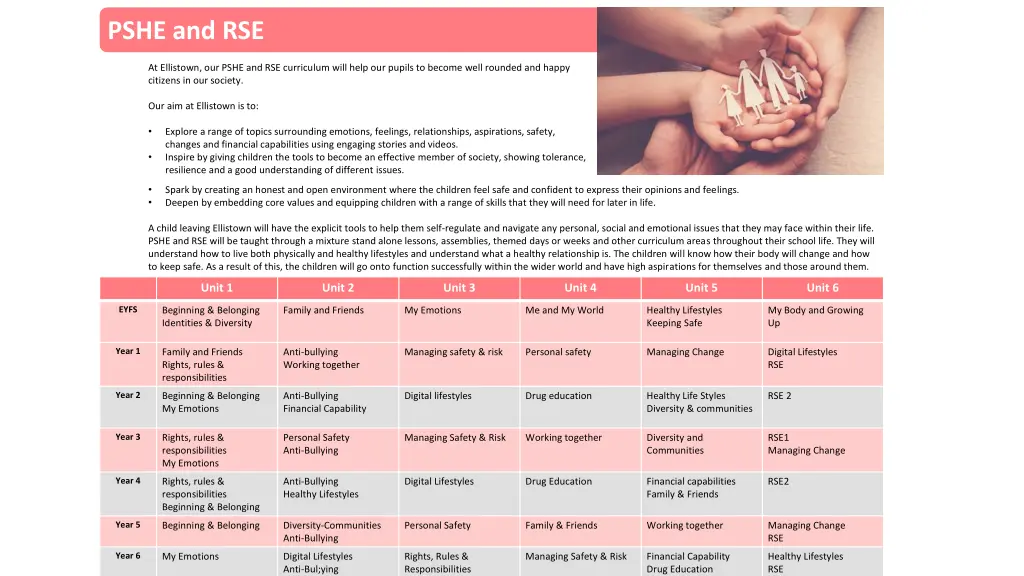
Enhancing Personal, Social, and Emotional Development through PSHE and RSE Curriculum
Explore how Ellistown's PSHE and RSE curriculum nurtures students to become well-rounded citizens by focusing on emotions, relationships, safety, and more. The curriculum aims to equip children with essential skills for life, teaching them self-regulation and preparing them to navigate societal challenges confidently. Discover the comprehensive approach of PSHE and RSE education at Ellistown through engaging stories, videos, and activities.
Download Presentation

Please find below an Image/Link to download the presentation.
The content on the website is provided AS IS for your information and personal use only. It may not be sold, licensed, or shared on other websites without obtaining consent from the author. If you encounter any issues during the download, it is possible that the publisher has removed the file from their server.
You are allowed to download the files provided on this website for personal or commercial use, subject to the condition that they are used lawfully. All files are the property of their respective owners.
The content on the website is provided AS IS for your information and personal use only. It may not be sold, licensed, or shared on other websites without obtaining consent from the author.
E N D
Presentation Transcript
PSHE and RSE At Ellistown, our PSHE and RSE curriculum will help our pupils to become well rounded and happy citizens in our society. Our aim at Ellistown is to: Explore a range of topics surrounding emotions, feelings, relationships, aspirations, safety, changes and financial capabilities using engaging stories and videos. Inspire by giving children the tools to become an effective member of society, showing tolerance, resilience and a good understanding of different issues. Spark by creating an honest and open environment where the children feel safe and confident to express their opinions and feelings. Deepen by embedding core values and equipping children with a range of skills that they will need for later in life. A child leaving Ellistown will have the explicit tools to help them self-regulate and navigate any personal, social and emotional issues that they may face within their life. PSHE and RSE will be taught through a mixture stand alone lessons, assemblies, themed days or weeks and other curriculum areas throughout their school life. They will understand how to live both physically and healthy lifestyles and understand what a healthy relationship is. The children will know how their body will change and how to keep safe. As a result of this, the children will go onto function successfully within the wider world and have high aspirations for themselves and those around them. Unit 1 Unit 2 Unit 3 Unit 4 Unit 5 Unit 6 EYFS Beginning & Belonging Identities & Diversity Family and Friends My Emotions Me and My World Healthy Lifestyles Keeping Safe My Body and Growing Up Year 1 Family and Friends Rights, rules & responsibilities Anti-bullying Working together Managing safety & risk Personal safety Managing Change Digital Lifestyles RSE Year 2 Beginning & Belonging My Emotions Anti-Bullying Financial Capability Digital lifestyles Drug education Healthy Life Styles Diversity & communities RSE 2 Year 3 Rights, rules & responsibilities My Emotions Personal Safety Anti-Bullying Managing Safety & Risk Working together Diversity and Communities RSE1 Managing Change Year 4 Rights, rules & responsibilities Beginning & Belonging Anti-Bullying Healthy Lifestyles Digital Lifestyles Drug Education Financial capabilities Family & Friends RSE2 Year 5 Beginning & Belonging Diversity-Communities Anti-Bullying Personal Safety Family & Friends Working together Managing Change RSE Year 6 My Emotions Digital Lifestyles Anti-Bul;ying Rights, Rules & Responsibilities Managing Safety & Risk Financial Capability Drug Education Healthy Lifestyles RSE
The National Curriculum for PSHE and RSE End of EYFS End of KS2 Personal, Social and Emotional Development Early Learning Goal: ELG: Self-Regulation Children at the expected level of development will: - Show an understanding of their own feelings and those of others, and begin to regulate their behaviour accordingly; - Set and work towards simple goals, being able to wait for what they want and control their immediate impulses when appropriate; - Give focused attention to what the teacher says, responding appropriately even when engaged in activity, and show an ability to follow instructions involving several ideas or actions. ELG: Managing Self Children at the expected level of development will: - Be confident to try new activities and show independence, resilience and perseverance in the face of challenge; - Explain the reasons for rules, know right from wrong and try to behave accordingly; - Manage their own basic hygiene and personal needs, including dressing, going to the toilet and understanding the importance of healthy food choices. ELG: Building Relationships Children at the expected level of development will: - Work and play cooperatively and take turns with others; - Form positive attachments to adults and friendships with peers; - Show sensitivity to their own and to others needs. RSE: Families and People Who Care For me, pupils should know -That families are important for children growing up because they can give love, security and stability. - the characteristics of healthy family life, commitment to each other, including in times of difficulty, protection and care for children and other family members, the importance of spending time together and sharing each other s lives. - that others families, either in school or in the wider world, sometimes look different from their family, but that they should respect those differences and know that other children s families are also characterised by love and care. - that stable, caring relationships, which may be of different types, are at the heart of happy families, and are important for children s security as they grow up. - that marriage represents a formal and legally recognised commitment of two people to each other which is intended to be lifelong. - how to recognise if family relationships are making them feel unhappy or unsafe, and how to seek help or advice from others if needed. Caring Friendships, pupils should know - how important friendships are in making us feel happy and secure, and how people choose and make friends. - the characteristics of friendships, including mutual respect, truthfulness, trustworthiness, loyalty, kindness, generosity, trust, sharing interests and experiences and support with problems and difficulties. - that healthy friendships are positive and welcoming towards others, and do not make others feel lonely or excluded. - that most friendships have ups and downs, and that these can often be worked through so that the friendship is repaired or even strengthened, and that resorting to violence is never right. - how to recognise who to trust and who not to trust, how to judge when a friendship is making them feel unhappy or uncomfortable, managing conflict, how to manage these situations and how to seek help or advice from others, if needed.
The National Curriculum for PSHE and RSE End of EYFS End of KS2 Communication and Language Early learning Goal: ELG: Listening, Attention and Understanding Children at the expected level of development will: - Listen attentively and respond to what they hear with relevant questions, comments and actions when being read to and during whole class discussions and small group interactions; - Make comments about what they have heard and ask questions to clarify their understanding; - Hold conversation when engaged in back-and-forth exchanges with their teacher and peers. ELG: Speaking Children at the expected level of development will: - Participate in small group, class and one-to-one discussions, offering their own ideas, using recently introduced vocabulary; - Offer explanations for why things might happen, making use of recently introduced vocabulary from stories, non-fiction, rhymes and poems when appropriate; - Express their ideas and feelings about their experiences using full sentences, including use of past, present and future tenses and making use of conjunctions, with modelling and support from their teacher. RSE: Respectful Relationships, pupils should know -The importance of respecting others, even when they are very different from them (for example, physically, in character, personality or backgrounds), or make different choices or have different preferences or beliefs. - practical steps they can take in a range of different contexts to improve or support respectful relationships. - the conventions of courtesy and manners. Online Relationships, pupils should know - that people sometimes behave differently online, including by pretending to be someone they are not. - that the same principles apply to online relationships as to face-to- face relationships, including the importance of respect for others online including when we are anonymous. - the rules and principles for keeping safe online, how to recognise risks, harmful content and contact, and how to report them. - how to critically consider their online friendships and sources of information including awareness of the risks associated with people they have never met. - how information and data is shared and used online. Being Safe, pupils should know - what sorts of boundaries are appropriate in friendships with peers and others (including in a digital context). - about the concept of privacy and the implications of it for both children and adults; including that it is not always right to keep secrets if they relate to being safe. - that each person s body belongs to them, and the differences between appropriate and inappropriate or unsafe physical, and other, contact. - how to respond safely and appropriately to adults they may encounter (in all contexts, including online) whom they do not know. - how to recognise and report feelings of being unsafe or feeling bad about any adult. - how to ask for advice or help for themselves or others, and to keep trying until they are heard. - how to report concerns or abuse, and the vocabulary and confidence needed to do so. - where to get advice e.g. family, school and/or other sources.
Ellistown PSHE and RSE Key Concepts Progression Map Economic Wellbeing Relationships Citizenship Myself & My Healthy & Safer Lifestyles Healthy & Safer Lifestyles (RSE) Unit 1 Unit 2 Unit 3 Unit 4 Unit 5 Unit 6 Beginning and Belonging (NB, GFG) Family and Friends My Emotions (C, R, GTBM) Me and My World Healthy Lifestyles Keeping Safe (Including Drug Education) EYFS Keeping Safe (Including Drug Education) Identities and Diversity My body and Growing up Family and Friends Managing Safety and Risk Personal Safety Digital Lifestyles Anti-bullying Managing Change Year 1 Working Together Rights, Rules and Responsibilities RSE Beginning and Belonging Digital Lifestyles Drug Education RSE Anti-Bullying Healthy lifestyles Year 2 Financial Capability My Emotions Diversity and Communities
Citizenship Economic Wellbeing Myself & My Relationships Healthy & Safer Lifestyles Healthy & Safer Lifestyles (RSE) Unit 1 Unit 2 Unit 3 Unit 4 Unit 5 Unit 6 Rights, Rules & Responsibilities Personal safety Managing safety and risk Working together Diversity and communities RSE 1 Year 3 Antibullying Managing Change My Emotions Rights, Rules & Responsibilities Antibullying Digital lifestyles Drug Education Financial capabilities RSE 2 Year 4 Healthy Lifestyles Family and Friends Beginning and belonging Beginning & Belonging Diversity Communities Personal Safety Family and Friends Working Together Managing Change Year 5 Antibullying RSE My Emotions Digital Lifestyles Rights, Rules & Responsibilities Managing Safety & Risk Financial Capability Year 6 Healthy Lifestyles Antibullying Drug Education RSE
Ellistown PSHE and RSE Knowledge and Skills Progression Key Concepts in RSE and PSHE Citizenship Economic Wellbeing Myself & My Relationships Healthy & Safer Lifestyles Healthy & Safer Lifestyles (RSE) EYFS Y1 Y2 Y3 Y4 Y5 Y6 Beginning and Belonging How am I special and what is special about other people in my class? What have I learnt to do and what would I like to learn next? How do we welcome new people to our class? What can I do to make the classroom a safe and happy place? How can I play and work well with others? How can I respect the needs of others? How does my behaviour make other people feel? Family and Friends Can I describe what a good friend is and does and how it feels to be friends? Why is telling the truth important? What skills do I need to choose, make and develop friendships? How might friendships go wrong, and how does it feel? How can I try to mend friendships if they have become difficult? What is my personal space and how do I talk to people about it? Who is in my family and how do we care for each other? Who are my special people, why are they special and how do they support me? Beginning and Belonging Do I understand simple ways to make sure my school is a safe, happy place? How can I get to know the people in my class? How do I feel when I am doing something new? How can I make someone feel welcome in class? What helps me manage in new situations? Who can help me at home and at school? Rights, Rules & Responsibilities What does it mean to be treated and to treat others with respect? Who are those in positions of authority within our school and communities and how can we show respect? Why do we need rules at home and at school? What part can I play in making and changing rules? What do we mean by rights and responsibilities? What are my responsibilities at home and at school? How do we make democratic decisions in school? What is a representative and how do we elect them? My Emotions Why is it important to accept and feel proud of who we are? What does the word unique mean and what do I feel proud of about myself? Why is mental wellbeing as important as physical wellbeing? How can I communicate my emotions? Can I recognise some simple ways to manage difficult emotions? What does it mean when someone says I am over reacting and how do I show understanding towards myself and others? How do my actions and feelings affect the way I and others feel? How do I care for other people s feelings? Who can I talk to about the way I feel? How can I disagree without being disagreeable? Rights, Rules & Responsibilities What does it mean to be treated and to treat others with respect? Who are those in positions of authority within our school and communities and how can we show respect? Why do we need rules at home and at school? What part can I play in making and changing rules? What do we mean by rights and responsibilities? What are my responsibilities at home and at school? How do we make democratic decisions in school? What is a representative and how do we elect them? Beginning and belonging What is my role in making my school a place where we can learn happily and safely? How can we build relationships in our class and how does this benefit me? What does it feel like to be new or to start something new? How can I help children and adults feel welcome in school? What helps me manage a new situation or learn something new? Who are the different people in my network who I can ask for help? Beginning & Belonging What are my responsibilities for making sure everyone in school feels happy and safe? How can I take responsibility for building relationships in my school and how does this benefit us all? How might different people feel when starting something new and how can I help? How do we make people feel welcome and valued in and out of school? What helps me to be resilient in a range of new situations? Are there more ways I can get help now and how do I seek support? My Emotions How can we make mental wellbeing a normal part of daily life, in the same way as physical wellbeing? What does it mean to have a strong sense of identity & self-respect ? What can I do to boost my self-respect? How do I manage strong emotions? How can I judge if my own feelings and behaviours are appropriate & proportionate? How do I recognise how other people feel and respond to them? What is loneliness and how can we manage feelings of isolation? How common is mental ill health and what self- care techniques can I use? What kinds of problems can be caused by impulsive online communication? How and from whom do I get support when things are difficult? My Emotions How can I stand up for myself? Can I name some different feelings? Can I describe situations in which I might feel happy, sad, cross etc? How do my feelings and actions affect others? How do I manage some of my emotions and associated behaviours? What are the different ways people might relax and what helps me to feel relaxed? Who do I share my feelings with? Identities and Diversity Who are the people in my class and how are we similar to and different from each other? Who are the different people who make up a family? What things are especially important to my family and me? What are some of the similarities and differences in the way people including families live their lives? How can we value different types of people including what they believe in and how they live their lives? How do we celebrate what we believe in and how is this different for different people? Unit 1 Rights, Rules and Responsibilities How do rules make me feel happy and safe How do I take part in making rules? Who looks after me and what are their responsibilities? What jobs and responsibilities do I have in school and at home? Can I listen to other people, share my views and take turns? Can I take part in discussions and decisions in class?
Ellistown PSHE and RSE Knowledge and Skills Progression Key Concepts in RSE and PSHE Citizenship Economic Wellbeing Myself & My Relationships Healthy & Safer Lifestyles Healthy & Safer Lifestyles (RSE) EYFS Y1 Y2 Y3 Y4 Y5 Y6 My Family and Friends Antibullying Why might people fall out with their friends? Can I describe what bullying is? Do I understand some of the reasons people bully others? Why is bullying never acceptable or respectful? How might people feel if they are being bullied? Anti-Bullying Who can I talk to if I have worries about friendship difficulties or bullying? How can I be assertive? Do I know what to do if I think someone is being bullied? How do people help me to build positive and safe relationships? What does my school do to stop bullying? Personal safety How do I recognise my own feelings and communicate them to others? Which school/classroom rules are about helping people to feel safe? Can I recognise when my Early Warning Signs are telling me I don t feel safe? What qualities do trusted adults and trusted friends have? Who is on my personal network and how can I ask them for help? What could I do if I feel worried about a friendship or family relationship? What sort of physical contact do I feel comfortable with and what could I do if physical contact is unwanted? How can I decide if a secret is safe or unsafe? How can I keep safe online? Antibullying What is the difference between direct and indirect forms of bullying? What are bystanders and followers and how might they feel? Do I understand that bullying might affect how people feel for a long time? How can I support people I know who are being bullied by being assertive? How does my school prevent bullying and support people involved? Diversity Communities How do other people s perceptions, views and stereotypes influence my sense of identity? How do views of gender affect my identity, friendships, behaviour & choices? What are people s different identities, locally and in the UK? How can I show respect to those with different lifestyles, beliefs & traditions? What are the negative effects of stereotyping? Which wider communities & groups am I part of & how does this benefit me? What are voluntary organisations and how do they make a difference? What is the role of the media and how does it influence me and my community? Who cares for the wider environment and what is my contribution? Digital Lifestyles What are some examples of how I use the internet, the services it offers, and how do I make decisions? What are the principles for my contact and conduct online, including when I am anonymous? How can I critically consider my online friendships, contacts and sources of information, and make positive contributions? How might the media shape my ideas about various issues and how can I challenge or reject these? Can I explain some ways in which information and data is shared and used online? How can online content impact on me positively or negatively? What are my responsibilities for my own and others mental and physical wellbeing online and how can I fulfil these? What are some ways of reporting concerns and why is it important to persist in asking? Can I identify, flag and report inappropriate content? Antibullying How can people s personal circumstances affect their experiences? How does prejudice sometimes lead people to bully others? Can I respond assertively to bullying, online and offline? How might bullying affect people s mental wellbeing and behaviour? How and why might peers become colluders or supporters in bullying situations? Can I identify ways of preventing bullying in school and the wider community? Who are my special people and why are they special to me? Who is my family and how do we care for each other? What is a friend? How can I be a good friend? How do I make new friends? How can I make up with friends when I have fallen out with them? How does what I do affect others? Do I know what to do if someone is unkind to me? (Includes antibullying Working Together What am I and other people good at? What new skills would I like to develop? How can I listen well to other people? RR How can I work well in a group? RR Why is it important to take turns? RR How can I negotiate to sort out disagreements? CF How are my skills useful in a group? What is a useful evaluation? RR Financial Capability Where does money come from and where does it go when we use it? How might I get money and what can I do with it? How do we pay for things? What does it mean to have more or less money than you need? How do I feel about money? How do my choices affect me, my family, others? What is a charity? Healthy Lifestyles What does healthy eating and a balanced diet mean? What is an active lifestyle and how does it help me to be healthier? What is mental wellbeing and how is it affected by my physical health? How much sleep do I need & what happens if I don t have enough? How do nutrition and physical activity work together? How can I plan and prepare simple, healthy meals safely? How can I look after my teeth and why is it important? Who is responsible for my lifestyle choices and how are these choices influenced? Antibullying How are falling out and bullying different? How do people use power when they bully others? What are the key characteristics of different types of bullying? How can lack of respect and empathy towards others lead to bullying? Antibullying Can I explain the differences between friendship difficulties and bullying? Can I define the characteristics and different forms of bullying? How do people use technology & social media to bully others and how can I help others to prevent and manage this? What do all types of bullying have in common? Might different groups experience bullying in different ways? Unit 2
Key Concepts in RSE and PSHE Citizenship Economic Wellbeing Myself & My Relationships Healthy & Safer Lifestyles Healthy & Safer Lifestyles (RSE) EYFS Y1 Y2 Y3 Y4 Y5 Y6 My Emotions Managing Safety and Risk Digital Lifestyles Managing safety and risk How do I feel in risky situations and how might my body react? Can I make decisions in risky situations and might my friends affect these decisions? When might I meet adults I don t know & how can I respond safely? What actions could I take in an emergency or accident and how can I call the emergency services? What are the benefits of using the roads and being near water and how can I reduce the risks? How is fire risky and how can I reduce the risks? How do I keep myself safe during activities and visits? How can I stop accidents happening at home and when I m out? Digital lifestyles How might my use of technology change as I get older, and how can I make healthier and safer decisions? How does my own and others online identity affect my decisions about communicating online? How might people with similar likes & interests get together online? Can I explain the difference between liking and trusting someone online? What does it mean to show respect online, and how could my feelings, and those of others, be affected by online content or contact? When looking at online content, what is the difference between opinions, beliefs and facts? Why is it important to ration the time we spend using technology and/or online? How might the things I see and do online affect how I feel and how healthy I am, and how can I get support when I need it? Why are social media, some computer games, online gaming and TV/films age restricted and how does peer influence play a part in my decision making? Personal Safety How do I recognise my own feelings and consider how my actions may affect the feelings of others? Can I use my Early Warning Signs to judge how safe I am feeling? How do I judge who is a trusted adult or trusted friend? How can I seek help or advice from someone on my personal network and when should I review my network? How could I report concerns of abuse or neglect? Can I identify appropriate & inappropriate or unsafe physical contact? How do I judge when it is not right to keep a secret and what action could I take? How can I recognise risks online and report concerns? What strategies can I use to assess risk and help me feel safer when I am feeling unsafe? Rights, Rules & Responsibilities What are the conventions of courtesy & manners and how do these vary? How does my behaviour online affect others & how can I show respect? Why is it important to keep my personal information private, especially online? How can I contribute to making and changing rules in school? How else can I make a difference in school? Are there places or times when I have to behave differently? What are the basic rights of children and adults? Why do we have laws in our country? How does democracy work in our community and in our country? What do councils, councillors, parliament and MPs do? Can I take part in a debate and listen to other people s views? RR Can I recognise and show my emotions? Can I recognise emotions in other people and say how they are feeling? Do I know what causes different emotions in myself and other people? How do I and others feel when things change? Do I know simple ways to make myself feel better? How can I help to make other people feel better? What are risky situations and how do they make me feel? What is my name, address and phone number and when might I need to give them? What is an emergency and who can help? What makes a place or activity safe for me? What are the benefits and risks for me when walking near the road, and how can I stay safer? What are the benefits and risks for me in the sun and how can I stay safer? What do I enjoy when I m near water and how can I stay safer? What are the risks for me if I am lost and how can I get help? How can I help to stop simple accidents from happening and how can I help if there is an accident? What are some examples of ways in which I use technology and the internet and what are the benefits? What is meant by identity and how might someone s identity online be different from their identity in the physical world? What are some examples of online content or contact which might mean I feel unsafe, worried or upset? What sort of information might I choose to put online and what do I need to consider before I do so? When might I need to report something and how would I do this? What sort of rules can help to keep us safer and healthier when using technology? Who can help me if I have questions or concerns about what I experience online or about others online behaviour? Unit 3 Me and My World Personal Safety Drug Education Working together What am I good at and what are others good at? What new skills would I like or need to develop? How well can I listen to other people? How do I ask open questions? How can I share my views and opinions effectively? How can different people contribute to a group task? How can I persevere and overcome obstacles to my learning? How can I work well in a group? What is useful evaluation? How do I give constructive feedback and receive it from others? Drug Education What medical & legal drugs do I know about, and what are their effects? Who uses and misuses legal drugs? Why do some people need medicine and who prescribes it? What are immunisations and have I had any? What are the safety rules for storing medicine and other risky substances? What should I do if I find something risky, like a syringe? What do I understand about how friends and the media persuade and influence me? Family and Friends What are the characteristics of healthy friendships on and offline and how do they benefit me? How do trust and loyalty feature in my relationships on and offline? What are the benefits and risks of making new friends, including those I only know online? Can I always balance the needs of family & friends & how do I manage this? Can I communicate, empathise & compromise when resolving friendship issues? How can I check that my friends give consent on and offline? How do people in my family continue to support each other as things change? Who are in my networks, on & offline, and how have these, changed and how do we support each other? Managing Safety & Risk When might it be good for my mental health for me to take a risk? What are the possible benefits and consequences of taking physical, emotional and social risks? When am I responsible for my own safety as I get older and how can I keep others safer? How can I safely get the attention of a known or unknown adult in an emergency? Can I carry out basic first aid in common situations, including head injuries? What are the benefits of cycling and walking on my own and how can I stay safer? How can being outside support my wellbeing & how do I keep myself safe in the sun? What are the benefits of using public transport and how can I stay safe near railways? How can I prevent accidents at school and at home, now that I can take more responsibility? Who are the people who help to look after me and my school How can I help to look after my school? How can I help to care for my things at home? Where do I live and what are the different places and features in my neighbourhood? Who are the people who live and work in my neighbourhood including people who help me? How can we look after the local neighbourhood and keep it special for everybody? What do animals and plants need to live and how can I help to take care of them? hat is money and why do we need it? How do we save money? Can I identify different feelings and tell others how I feel? Which school/classroom rules are about helping people to feel safe? Can I name my own Early Warning Signs? How do I know which adults and friends I can trust? Who could I talk with if I have a worry or need to ask for help? What could I do if a friend or someone in my family isn t kind to me? Can I identify private body parts and say no to unwanted touch? What could I do if I feel worried about a secret? What could I do if something worries or upsets me when I am online? Which substances might enter our bodies, how do they get there and what do they do? What are medicines and why and when do some people use them? When and why do people have an injection from a doctor or a nurse? Who is in charge of what medicine I take? What different things can help me feel better if I feel poorly? How can I keep safe with medicines and substances at home and at school? What is persuasion and how does it feel to be persuaded? Unit 4
Key Concepts in RSE and PSHE Citizenship Economic Wellbeing Myself & My Relationships Healthy & Safer Lifestyles Healthy & Safer Lifestyles (RSE) EYFS Y1 Y2 Y3 Y4 Y5 Y6 My body and growing up What does my body look like? How has my body changed as it has grown? What can my body do? What differences and similarities are there between our bodies? How can I look after my body and keep it clean? How am I learning to take care of myself and what do I still need help with? Who are the members of my family and trusted people who look after me? How do I feel about growing up? RSE What are the names of the main parts of the body? What can my amazing body do? When am I in charge of my actions and my body? How can I keep my body clean? How can I avoid spreading common illnesses and diseases? RSE How do babies change and grow? (Statutory NC Science Y2) How have I changed since I was a baby? (Statutory NC Science Y2) What s growing in that bump? (Sex Education/NC Science) What do babies and children need from their families? Which stable, caring relationships are at the heart of families I know? What are my responsibilities now I m growing up? Diversity and Communities What have we got in common and how are we different? How might others expectations of girls and boys affect people s feelings and choices? How are our families the same and how are they different? Do people who live in my locality have different traditions, cultures and beliefs? How does valuing diversity benefit everyone? Why are stereotypes unfair and how can I challenge them? How do people in my locality benefit from being part of different groups? What are the roles of people who support others with different needs in my community? How does the media work in my community? How can we care for the local environment and what are the benefits? What do animals need, and what are our responsibilities? Financial Capabilities What different ways are there to earn and spend money? What do saving, spending and budgeting mean to me? ow can I decide what to spend my money on and choose the best way to pay? What might my family have to spend money on? What is value for money ? How do my feelings about money change? How do my choices affect my family, the community, the world and me? Working Together What are my strengths and skills and how are they seen by others? What helps me learn new skills effectively? What would I like to improve and how can I achieve this? How could my skills and strengths be used in future employment? What are some of the jobs that people do? How can I be a good listener to other people? How can I share my views effectively and negotiate with others to reach agreement? How can I persevere and help others to do so? How can I give, receive and act on sensitive and constructive feedback? Financial Capability What different ways are there to gain money? What sort of things do adults need to pay for? How can I afford the things I want or need? How can I make sure I get value for money ? Why don t people get all the money they earn? How is money used to benefit the community or the wider world? What is poverty? Drug Education What do I know about medicines, alcohol, smoking, solvents and illegal drugs and why people use them? How does drug use affect the way a body or brain works? How do medicines help people with different illnesses? What immunisations have I had or may I have in future and how do they keep me healthy? What is drug misuse? What are some of the laws about drugs? When and how should I check information about drugs? Keeping Safe What do I think I have to keep safe from? How do I know if something is safe or unsafe? Do I understand simple safety rules for when I am at home, at school and when I am out and about? Can I say No! if I feel unsure about something and it does not feel safe or good? Family and Friends How do good friends behave on and offline and how do I feel as a result? What is a healthy friendship and how does trust play an essential part? What skills do I need for choosing, making and developing friendships and how effective are they? How can I help to resolve disagreements positively by listening and compromising? Can I empathise with other people in a disagreement? How can I check with my friends that their personal boundaries have not been crossed? How do my family members help each other to feel safe and secure even when things are tough? Who is in my network of special people now and how do we affect and support each other? Unit 5 Diversity and Communities What makes me me , what makes you you ? Do all boys and all girls like the same things? What is my family like and how are other families different? What different groups do we belong to?
Key Concepts in RSE and PSHE Citizenship Economic Wellbeing Myself & My Relationships Healthy & Safer Lifestyles Healthy & Safer Lifestyles (RSE) EYFS Y1 Y2 Y3 Y4 Y5 Y6 Keeping Safe Can I ask for help and tell people who care for me if I am worried or upset? Who are the people who help to keep me safe? What goes on to and into my body and who puts it there? Why do people use medicines? What are the safety rules relating to medicines and who helps me with these? Digital Lifestyles What are some examples of ways in which I use technology and the internet and what are the benefits? What is meant by identity and how might someone s identity online be different from their identity in the physical world? What are some examples of online content or contact which might mean I feel unsafe, worried or upset? What sort of information might I choose to put online and what do I need to consider before I do so? When might I need to report something and how would I do this? What sort of rules can help to keep us safer and healthier when using technology? Who can help me if I have questions or concerns about what I experience online or about others online behaviour? Diversity and Communities What is a stereotype and can I give some examples? Who helps people in my locality and what help do they need? What does my community mean and how does it feel to be part of it? How do people find out about what is happening in my community? How do we care for animals and plants? How can I help look after my school? RSE 1 How are male and female bodies different and what are the different parts called? When do we talk about our bodies, how they change, and who do we talk to? What can my body do and how is it special? Why is it important to keep myself clean? What can I do for myself to stay clean and how will this change in the future? How do different illnesses and diseases spread and what can I do to prevent this? RSE 2 What are the main stages of the human life cycle? Science How did I begin? Sex Education What does it mean to be grown up ? What am I responsible for now and how will this change? How do different caring, stable, adult relationships create a secure environment for children to grow up? Managing Change What positive and negative changes might people experience? How do people s emotions evolve over time as they experience loss and change? How can I manage the changing influences and pressures on my friendships and relationships? What different strategies do people use to manage feelings linked to loss and change and how can I help? How might people whose families change feel? When might change lead to positive outcomes for people? What positive and negative changes have I experienced and how have these experiences affected me? What strategies will help me to thrive when I move to my next school? Healthy Lifestyles How does physical activity help me & what might be the risks of not engaging in it? What could characterise a balanced or unbalanced diet and what are the associated benefits and risks? What are the different aspects of a healthy lifestyle and how could I become healthier? What are the factors influencing me when I m making lifestyle choices and how might these change over time? What might be the signs of physical illness and how might I respond? What are the benefits and risks of spending time online/on electronic devices, in terms of my physical and mental health? Why are online apps and games age restricted? Healthy Lifestyles What things can I do when I feel good and healthy? What can t I do when I am feeling ill or not so healthy? What can I do to help keep my body healthy? Do I understand why food and drink are good for us? Do I understand what exercise is and why it is good for us? Do I understand why rest and sleep are good for us? Healthy Lifestyles How can I stay as healthy as possible? What does it feel like to be healthy? What does healthy eating mean and why is it important? Why is it important to be active & what are the opportunities for physical activity? What foods do I like and dislike and why? What can help us eat healthily? Why do we need food? What healthy choices can I make? Managing Change What changes have I and my peers already experienced and what might happen in the future? What helps me when I m experiencing strong emotions due to loss or change? What strategies help me to thrive when my friendships change? How might I behave when I feel strong emotions linked to loss and change? How might people feel when loved ones or pets die, or they are separated from them for other reasons? What changes might people welcome and how can they plan for these? Unit 6 RSE What are different ways babies are conceived and born? (Sex Education) What effect might puberty have on people s feelings and emotions? How can my words or actions affect how others feel, and what are my responsibilities? What should adults think about before they have children? Why might people get married or become civil partners? What are different families like? RSE What are male and female sexual parts called and what are their functions? How can I talk about bodies confidently and appropriately? What happens to different bodies at puberty? What might influence my view of my body? How can I keep my growing and changing body clean? How can I reduce the spread of viruses and bacteria? Managing Change How are my achievements, skills and responsibilities changing and what else might change? How might people feel during times of loss and change? How do friendships change? What helps me to feel calmer when I am experiencing strong emotions linked to loss and change? How might people feel when they lose a special possession? When can I make choices about changes?

